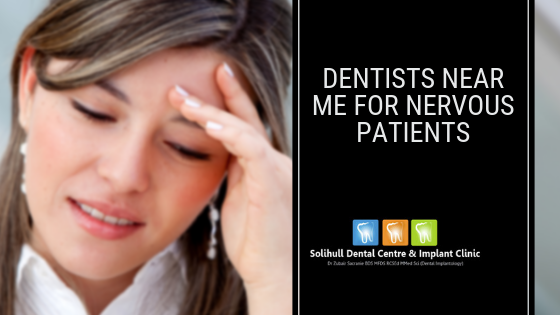
Dental anxiety and fear are quite common concerns when visiting the dentist, hence the reason people search for the phrase ‘dentist near me for nervous patients’, this is quite understandable!
So, to help, we’ve researched some of the most common questions that people ask when they are nervous about visiting the dentist.
Do dentists hate to see anxious patients?
No, we don’t hate seeing anxious patients at all. We absolutely understand that it can often be quite disconcerting going to the dentist. Panic attacks and actual dental phobia unfortunately relatively rare.
What’s important is to let your dentist know that you are anxious, That way we can look for ways to help you know you are in safe hands and to help you overcome any physical symptoms of your anxiety.
The fight or flight response can be quite strong when we are put under stressful situations, communicating with us PRIOR to your appointment means we can understand what triggers any anxiety disorder and help avoid any trigger situation.
How can people overcome fear of going to the dentist?
A few simple tips are as follows:
- Book an appointment in the morning, this will ensure you can relax for the rest of the day as your appointment will be over.
- For regular appointments, make sure you have a good breakfast. This will set you up for the day and ensure your energy levels remain high.
- Lay off the alcohol! Not only does it dehydrate you but it can also make you worry.
- Bring a friend. Decide before hand on what you are going to talk about, make it subjects that relax you and keep you calm. Perhaps discuss a recent holiday, or where you are going next time.
- Recognise that you have an inner voice talking to you (we all have this) and that this inner voice can actually be controlled.
- Talk openly to us. We will NOT judge you or tell you off for not coming to see us… honestly
- Agree a stop signal with us, this will ensure that (like you inner voice technique) YOU are in control
It’s an incredibly important that you to visit the dentist regularly, to keep your dental health in tiptop condition and also ensure that you have routine oral cancer checks.
Is it normal that I’m scared of dentists judging my teeth?
It is quite a common misconception that dentists will judge your teeth. We absolutely will not. Our role is to investigate and report on anything clinically that we see. If we see a problem with your teeth we will let you know, based on the clinical evidence presented before us.
NEVER will we judge your teeth or anything about you. We may give you advice to get the best dental treatment to help you, but this is always done in a non-judgemental factual way.
What are my options if I’m terrified of the dentist?
There are a few options to help with anxiety or panic disorder at the dentist, we always recommend going with the least invasive option to begin with, in ascending order these are:
- Talk to your dentist, be open and honest, follow our advice above and relax knowing that we have your best interests at heart.
- Ask your dentist for oral sedation prior to visiting, a simple tablet can help you relax.
- Relative analgesia could also be used, this is laughing gas, it is self-administered at the dentist and can help you relax deeply. Not all practices offer relative analgesia.
- Conscious sedation via intravenous injection. This is often known as twilight sedation, you will be conscious but so deeply relaxed that you will have no recollection of your treatment at all. Many patients opt for this type of sedation when having treatments such as dental implants.
Why are most little kids afraid of dentists?
The honest truth is that children learn to feel nervous! Most commonly kids learn the behaviour from parents. Modern dentistry can be made extremely comfortable for adults and children alike and people are often surprised that it is completely pain-free most of the time.
Unfortunately people don’t often realise this and accidentally pass on dental anxieties to their kids.
One of the best ways to overcome this is to bring children to the dentist at a very early age, allow them to sit on your lap in the dental chair at the beginning, progressing to them sitting alone on the chair and just enjoying the ride as it goes up and down. As they progress into toddlers we can then begin to look in their mouth in a very gentle way.
How many adults have fears of going to the dentist?
In the United States up to 75% of people have some form of dental anxiety, according to the Journal of The American Dental Association. In addition to this approximately 20% of those people have a diagnosis of an anxiety disorder or phobia.
Oddly, in the UK these figures seem to be much lower:
- One in every seven adults who has ever been to a dentist suffers from extreme dental anxiety
- The most common fears for visiting a dentist are having a tooth drilled (30%) and having a local anaesthetic injection (28%)
- Visiting the Dentist is ranked number one (22%) for making people nervous, closely followed by heights (19%). Nearly 10 times as many people (22%) are nervous of visiting their dentists, compared to their doctor (2%)
Figures quoted via The British Dental Association.



